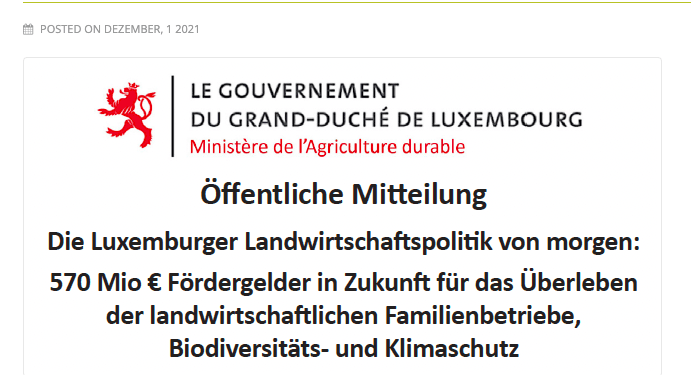“€570 million in future subsidies for the survival of family farms, biodiversity and climate protection.” This is what the fictitious statement by the equally inexistent ministry of sustainable agriculture promises. The visual, a joint effort between three key environmental institutions in the grand duchy, aimed to be noticed by the real agriculture ministry.
A success, in a way. The ministry of agriculture, currently headed by Romain Schneider (LSAP) reacted to the advert: “We are in an era where fake news make public discourse difficult, and it is therefore even more questionable that three respected organisations would consciously deceive readers to communicate their vision on the new orientation of agriculture.”
The groups said the campaign was the only way to get the ministry’s attention, as previous calls to change had been ignored. The foot of the letter included the names, logos and addresses of all three actors, which “should make it evident that it was our project,” says Blanche Weber of the Mouvement écologique (Meco). The header, however, copies the look of Luxembourg’s ministries.

The open letter copied the Ministry of agriculture’s official press release header, in a bid to express the groups’ disapproval of the current national agricultural strategy, which they deem a hazard to the environment and biodiversity. Natur&ëmwelt
Current agricultural strategy a danger to nature
“It was published--and this is very important for us--in parallel and together with our detailed position paper in relation to the implementation of the common agricultural policy in Luxembourg,” Weber said in an email to Delano.
The campaign published on 1 December, among other points, criticised the lack of inclusion of citizens and environmental and consumer groups in discussions concerning the drafting of the national strategy for future agricultural policies, saying that any content available was too voluminous and specialised for the average person to read.
The ministry on 3 December reacted to natur&ëmwelt’s statement, saying: “In the framework of this public and transparent procedure, all stakeholders were able to submit their opinions and criticisms which will be analysed,” adding that the plan will be submitted to the government council before 31 December, before being forwarded to the European Commission.
The publication date marked the end of the public consultation on the future agricultural strategy of Luxembourg.
“The paradigm shift that we so urgently need at all levels is not even remotely addressed in this plan, on the contrary. If the draft of the Luxembourg strategy plan is not adapted in central elements, the failed agricultural policy of the past decades will be cemented and hundreds of millions of euros will be squandered,” said the organisations in their open letter.
Though an EU-wide reform , the groups point out that it doesn’t ask anything specific of member states, leaving them to decide on their own what measures to take towards a sustainable future.
Necessary means to an end
“In other countries the draft strategies were developed together with all stakeholders. This was not the case in Luxembourg. For a long time now we have been promised the introduction of a round table to discuss agrarian policy in Luxembourg, but this promise has never been implemented,” says Weber.
To address the issue and demand the change they consider essential to the survival of Luxembourg’s biodiversity--which is mainly impacted by the agricultural sector--the groups decided to forge the ministry’s official template for statements.
“What is important to us is that the data related to biodiversity loss etc. is official data,” says Weber. “We thought long and hard before we decided on this approach. But it is a fact that our organisations in particular have been making concrete suggestions for decades in this area, without the necessary changes taking place and without a structured debate having been initiated.”
Meco and natur&ëmwelt recently filed an official complaint against the government regarding their inaction towards the loss of local biodiversity, as reported by .
“This is absolutely necessary in the interest of the survival of small and medium-sized enterprises, fair remuneration for the work they do for the common good, and the preservation of environmental assets.”
Delano has reached out to the ministry of agriculture for a comment. Article updated on 3 December, following a response from the ministry.
